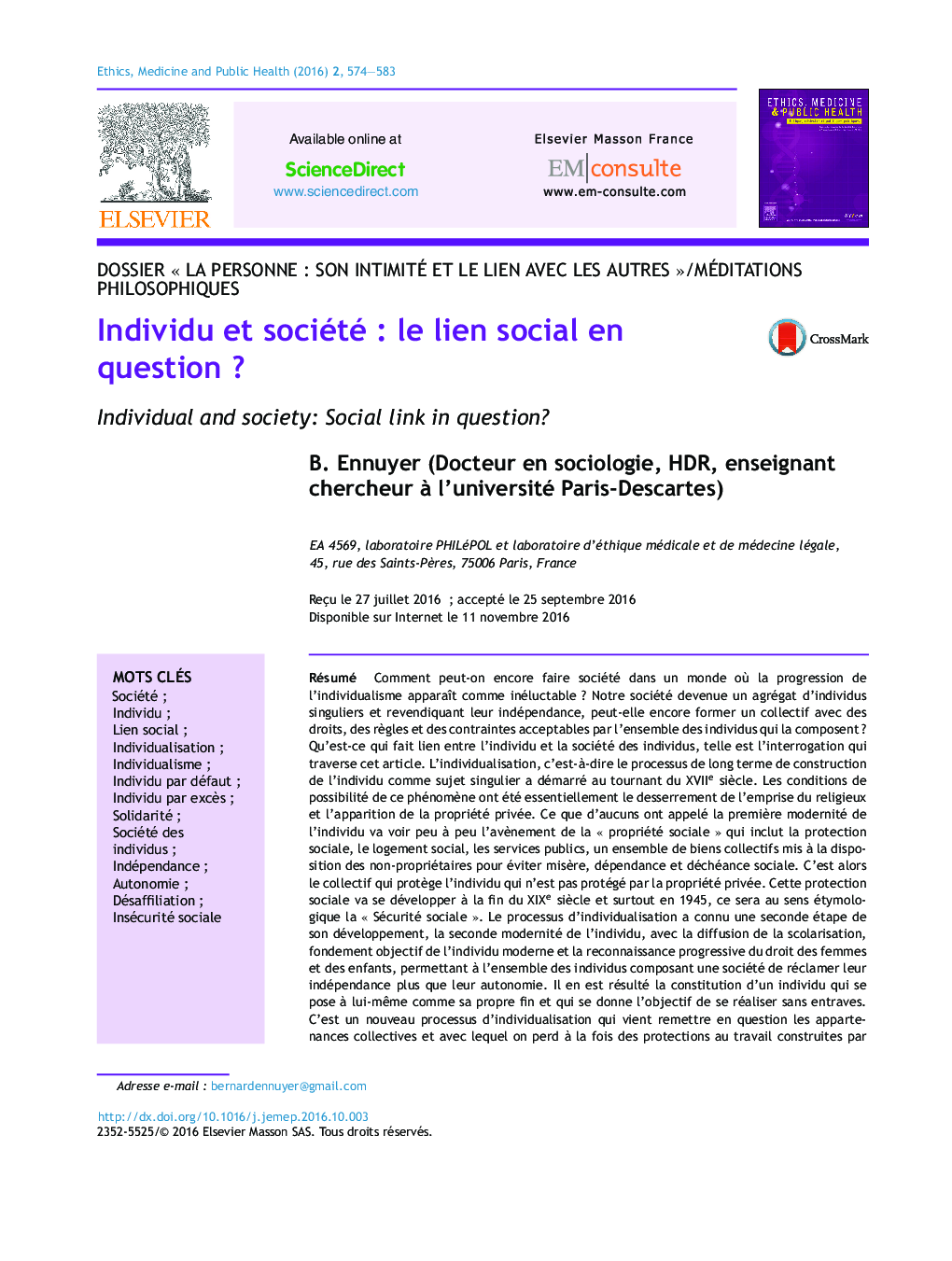| کد مقاله | کد نشریه | سال انتشار | مقاله انگلیسی | نسخه تمام متن |
|---|---|---|---|---|
| 7531721 | 1487636 | 2016 | 10 صفحه PDF | دانلود رایگان |
عنوان انگلیسی مقاله ISI
Individu et société : le lien social en question ?
دانلود مقاله + سفارش ترجمه
دانلود مقاله ISI انگلیسی
رایگان برای ایرانیان
کلمات کلیدی
IndividuSocial insecurityDisaffiliationSocial linkIndépendanceSolidarité - اتحادIndependence - استقلالSociety - جامعهAutonomy - خود مختاریAutonomie - خودمختاریIndividual - شخصیIndividualization - شخصی سازیSociété - شرکتIndividualisme - فرد گراییIndividualisation - فردگراییIndividualism - فردگراییSolidarity - همبستگیLien social - وابسته به اجتماع
موضوعات مرتبط
علوم پزشکی و سلامت
پزشکی و دندانپزشکی
مراقبت های ویژه و مراقبتهای ویژه پزشکی
پیش نمایش صفحه اول مقاله

چکیده انگلیسی
How can we still make society in a world where the rise of individualism appears as inevitable? Our company became an aggregate of single individuals claiming their independence. How can this society form a group with rights, rules and constraints acceptable by all the individuals who compose it? What is the link between the individual and a society of individuals, that is the question that runs through this article. The individualisation, i.e. the long-term process of building the individual as a singular subject, began at the turn of the 17th c. The conditions possibility of this phenomenon were essentially the loosening of the grip of religious and the emergence of private property. What some have called “the first modernity of individual” will gradually see the advent of “social property” that includes social protection, social housing, public services, a set of public goods made available to non-homeowners to avoid poverty, dependence and social decay. That is when the collective protects the individual who is not protected by private property. This social protection will develop in the late 19th c. and especially in 1945, with the etymological sense of “Social security”. The process of individualization experienced a second stage of its development, the second modernity of the individual, with the spread of education, objective foundation of the modern individual, and the gradual recognition of the right of women and children, allowing all individuals in a society to claim their independence more than autonomy. This resulted in the formation of an individual who arises to himself as his own end and that gives itself the objective of achieving unhindered. This new process of individualization questions the collective membership, and with which one loses both protections at work built by the state, but also the close protection, family, neighborhood, membership to a community, a loss that the sociologist Robert Castel called the process of “disaffiliation”. In a society where social ownership and social citizenship are threatened, the modern individual or “ultra modern” is more complex. The collective media get weak and let out a number of individuals who are no longer covered by these systems, a new form of negative individuality is taking place because of that stall collective and gives “individuals by default”. In contrast to previous, “individuals by excesses” are individuals whose main objective is to achieve as an individual by detaching affiliations and collective values. Today, we can say that everyone is likely to recess if the group does not supports, hence, the fear of decommissioning that is spreading in the younger generations for individuals whose employment status is not guaranteed. “The individual does not stand alone” is a required evidence. Assert the preeminence of the society is asking that the individual can only exist in a form of social link with a collective, it has rights and duties towards this group. So, to strengthen these links between the individual and the collective, several tracks are possible: relentlessly fight against the growing social inequality, a major source of disaffiliation of many individuals today, then expand the “capabilities” of individuals in the sense that the philosopher Martha Nussbaum gives to this term, i.e. a set of freedoms and real opportunities in the field of education, health, employment, housing, etc. not just formal rights and finally enable individuals to invent new forms of sociability, especially in a sharing and collaborative economy. All these new forms of sociability and solidarity that are trying to implement, sometimes groping, are paths for the future of “our” society of individuals in which we are inextricably “single individual” and “collective self” as Norbert Elias said.
ناشر
Database: Elsevier - ScienceDirect (ساینس دایرکت)
Journal: Ethics, Medicine and Public Health - Volume 2, Issue 4, OctoberâDecember 2016, Pages 574-583
Journal: Ethics, Medicine and Public Health - Volume 2, Issue 4, OctoberâDecember 2016, Pages 574-583
نویسندگان
B. (Docteur en sociologie, HDR, enseignant chercheur à l'université Paris-Descartes),